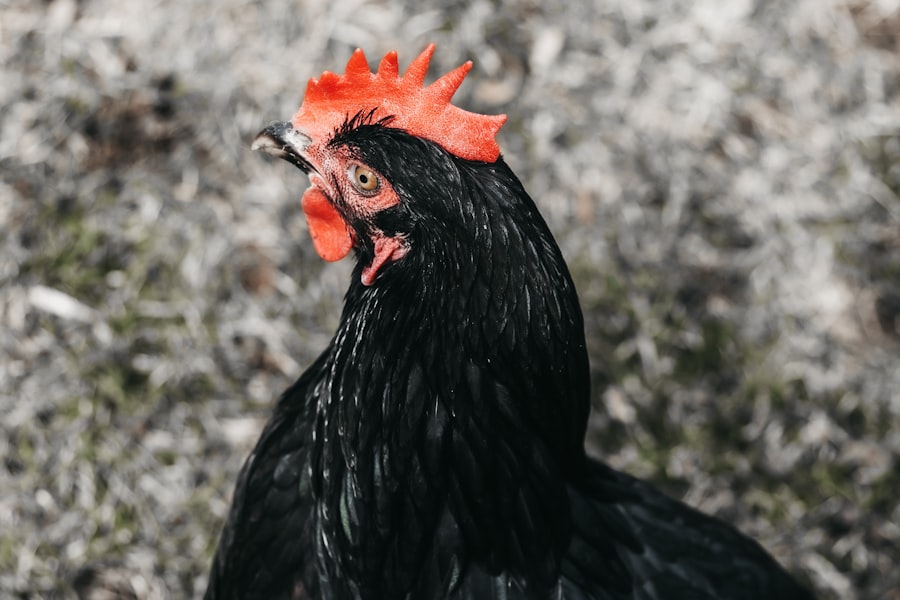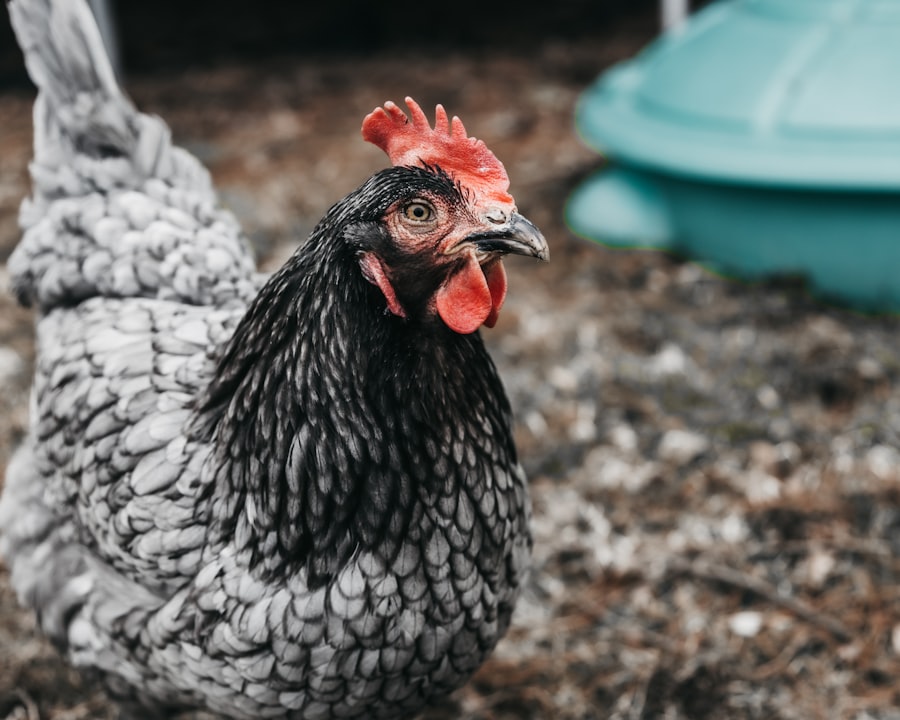Mites are microscopic arachnids that can parasitize chickens, causing various health issues. Several species of mites affect poultry, with the most prevalent being the red mite (Dermanyssus gallinae), northern fowl mite (Ornithonyssus sylviarum), and scaly leg mite (Knemidocoptes mutans). These parasites can lead to skin irritation, feather loss, anemia, and disease transmission in chickens.
Red mites are particularly problematic due to their nocturnal feeding habits, consuming blood from chickens during nighttime hours. This behavior causes stress and discomfort to the birds. Signs of mite infestation include restlessness, reduced egg production, pale combs and wattles, and visible mites on the birds or in their living areas.
Severe mite infestations can result in anemia, weakness, and decreased egg laying in chickens. The stress and discomfort caused by mites may also lead to behavioral changes in affected birds. Recognizing the signs of mite infestation is crucial for chicken owners to implement timely prevention and control measures, ensuring the health and productivity of their flocks.
Proactive management of mite infestations is essential for maintaining a healthy and comfortable environment for chickens. This includes regular inspection of birds and their living areas, implementation of appropriate hygiene practices, and the use of approved treatments when necessary. By addressing mite infestations promptly, chicken owners can minimize the negative impacts on their flock’s health, egg production, and overall well-being.
Table of Contents
- 1 Implementing regular coop cleaning and maintenance
- 2 Providing dust baths for your chickens
- 3 Using natural remedies to repel mites
- 4 Introducing predator insects to control mite populations
- 5 Consulting with a veterinarian for preventative measures
- 6 Monitoring your chickens for signs of mites and taking action promptly
- 7 FAQs
- 7.1 What are mites and why are they a problem for chickens?
- 7.2 How can I prevent mites from infesting my chickens?
- 7.3 What are some natural remedies for treating mites in chickens?
- 7.4 Are there any commercial products available for treating mites in chickens?
- 7.5 How often should I check my chickens for mites?
Key Takeaways
- Mites can pose a serious threat to the health of your chickens, causing irritation, stress, and potential disease transmission.
- Regular cleaning and maintenance of your chicken coop is essential in preventing mite infestations and keeping your chickens healthy.
- Providing dust baths for your chickens can help them naturally repel and control mite populations on their own.
- Natural remedies such as diatomaceous earth and essential oils can be effective in repelling mites from your chicken coop.
- Introducing predator insects like ladybugs and predatory mites can help control mite populations in a natural and chemical-free way.
- Consulting with a veterinarian can provide valuable guidance on preventative measures and treatment options for mite infestations in chickens.
- Regularly monitoring your chickens for signs of mites, such as feather loss and irritation, and taking prompt action to address any infestations is crucial for their health and well-being.
Implementing regular coop cleaning and maintenance
Keep the Coop Clean and Dry
Keeping the coop clean and dry is crucial for reducing the risk of mites taking hold in the environment. This involves regularly removing soiled bedding, droppings, and any leftover food or debris that can attract pests.
Inspect and Clean Coop Furnishings
Regularly inspecting and cleaning nesting boxes, perches, and other coop furnishings can help eliminate potential hiding spots for mites. By maintaining a clean and well-ventilated coop, you can create an environment that is less hospitable to mites and other pests, reducing the risk of infestations and promoting the overall health of your flock.
Practice Good Coop Maintenance
In addition to regular cleaning, it’s important to practice good coop maintenance to prevent mite infestations. This includes sealing any cracks or crevices in the coop where mites can hide and breed, as well as regularly treating the coop with natural pest repellents. Implementing a regular schedule for coop cleaning and maintenance can help reduce the risk of mite infestations, ensuring that your chickens have a clean and healthy living environment.
Providing dust baths for your chickens

Dust baths are an essential part of a chicken’s natural grooming behavior and play a crucial role in preventing and controlling mite infestations. Chickens instinctively take dust baths to help keep their feathers clean and healthy, as well as to remove parasites such as mites. Providing your chickens with access to a dust bathing area is essential for promoting their overall health and well-being.
This can be achieved by creating a designated dust bathing area in the coop or run, filled with fine dust or sand that chickens can use to bathe in. By allowing your chickens to engage in this natural behavior, you can help them to keep mites at bay and maintain healthy feathers and skin. In addition to providing a dust bathing area, it’s important to ensure that the area is kept clean and dry to be effective in controlling mites.
Regularly refreshing the dust or sand in the bathing area can help to ensure that it remains effective in removing parasites from the chickens’ feathers. By providing your chickens with access to a dust bathing area and maintaining it properly, you can help them to naturally control mite infestations and promote their overall health and well-being.
Using natural remedies to repel mites
Natural remedies can be an effective way to repel mites from your chicken coop and promote a healthy living environment for your flock. There are several natural ingredients that have been found to be effective in repelling mites, including diatomaceous earth, garlic, neem oil, and herbs such as lavender and mint. These natural remedies can be used in various ways, such as adding them to the chickens’ dust bathing area, sprinkling them in the coop bedding, or using them as a spray to treat coop furnishings.
By incorporating natural remedies into your coop maintenance routine, you can help to repel mites and other pests while avoiding the use of harsh chemicals that may be harmful to your chickens. In addition to using natural remedies in the coop environment, it’s also important to consider the use of natural pest repellents on the chickens themselves. This can include using herbal sprays or essential oil blends that have been found to be effective in repelling mites from the birds’ feathers.
By using natural remedies both in the coop environment and directly on the chickens, you can create a comprehensive approach to repelling mites and promoting the overall health and well-being of your flock.
Introducing predator insects to control mite populations
Introducing predator insects into your chicken coop can be an effective way to naturally control mite populations without the use of chemicals or pesticides. There are several species of predator insects that are known to feed on mites, including predatory mites, ladybugs, lacewings, and parasitic wasps. These beneficial insects can help to keep mite populations in check by preying on them and preventing infestations from taking hold in the coop environment.
By introducing predator insects into your coop, you can create a natural balance that helps to control mite populations while promoting a healthy living environment for your flock. In addition to introducing predator insects into the coop environment, it’s important to create habitat conditions that are conducive to their survival. This includes providing shelter, food sources, and water for predator insects to thrive in the coop environment.
By creating a welcoming habitat for these beneficial insects, you can encourage their presence in the coop and promote their ability to control mite populations naturally. By incorporating predator insects into your coop management practices, you can create a sustainable approach to controlling mites while promoting a healthy and balanced ecosystem for your flock.
Consulting with a veterinarian for preventative measures

Seeking Professional Guidance
Consulting with a veterinarian who specializes in poultry health can be an invaluable resource for implementing preventative measures against mite infestations in your chicken flock. A veterinarian can provide guidance on effective parasite control strategies, as well as recommend appropriate products for treating mite infestations if they occur. Additionally, a veterinarian can offer advice on preventative measures such as vaccination programs, biosecurity protocols, and nutritional strategies that can help to support your flock’s overall health and resilience against parasites.
Tailored Preventative Measures
By consulting with a veterinarian who has expertise in poultry health, you can gain valuable insights into preventative measures that are tailored to the specific needs of your flock. In addition to seeking professional guidance from a veterinarian, it’s important for chicken owners to stay informed about best practices for parasite control and preventative measures.
Staying Informed
This includes staying up-to-date on research findings, industry recommendations, and emerging trends in poultry health management. By staying informed about preventative measures for mite infestations, you can make informed decisions about how best to protect your flock from these pesky parasites.
A Proactive Approach
By taking a proactive approach to seeking professional guidance and staying informed about preventative measures, you can ensure that your flock is well-protected against mite infestations and other health threats.
Monitoring your chickens for signs of mites and taking action promptly
Regularly monitoring your chickens for signs of mites is essential for early detection and prompt action against infestations. This includes regularly inspecting the birds’ feathers, skin, combs, wattles, and legs for any signs of irritation or visible parasites. Additionally, observing changes in behavior such as restlessness or decreased egg production can also be indicative of a potential mite infestation.
By staying vigilant and proactive in monitoring your flock for signs of mites, you can take prompt action to address infestations before they become severe. In addition to monitoring for signs of mites, it’s important to have a plan of action in place for addressing infestations promptly if they occur. This may include implementing targeted treatments such as natural pest repellents or seeking professional guidance from a veterinarian for more severe infestations.
By taking prompt action against mite infestations, you can help to minimize the impact on your flock’s health and well-being while preventing infestations from spreading throughout the coop environment. By staying vigilant in monitoring your flock for signs of mites and taking prompt action when needed, you can help to protect your chickens from the threat of these pesky parasites. In conclusion, understanding the threat of mites to your chickens is crucial for maintaining a healthy and productive flock.
By implementing regular coop cleaning and maintenance practices, providing dust baths for your chickens, using natural remedies to repel mites, introducing predator insects into the coop environment, consulting with a veterinarian for preventative measures, and monitoring your chickens for signs of mites and taking action promptly, you can create a comprehensive approach to preventing and controlling mite infestations. By taking proactive measures to protect your flock from these pesky parasites, you can ensure that your chickens are able to thrive in a safe and comfortable environment.
If you’re looking for tips on how to keep chickens from getting mites, you might also be interested in learning about the importance of the size of the coop for your chickens. Check out this article for helpful information on creating a comfortable and spacious living environment for your feathered friends.
FAQs
What are mites and why are they a problem for chickens?
Mites are small parasites that can infest chickens and cause irritation, discomfort, and potential health problems. They can also spread to other birds and animals on the property.
How can I prevent mites from infesting my chickens?
To prevent mites, regularly clean and disinfect the chicken coop, provide dust baths for the chickens, and regularly inspect the birds for signs of infestation.
What are some natural remedies for treating mites in chickens?
Some natural remedies for treating mites in chickens include diatomaceous earth, garlic, and essential oils such as lavender or tea tree oil. These can be used in the coop or directly on the chickens.
Are there any commercial products available for treating mites in chickens?
Yes, there are commercial products such as poultry dust, sprays, and powders specifically designed to treat and prevent mites in chickens. It’s important to follow the instructions carefully when using these products.
How often should I check my chickens for mites?
It’s a good idea to check your chickens for mites regularly, at least once a week, especially during warmer months when mite populations tend to increase. Regular inspections can help catch infestations early and prevent them from spreading.
Meet Walter, the feathered-friend fanatic of Florida! Nestled in the sunshine state, Walter struts through life with his feathered companions, clucking his way to happiness. With a coop that’s fancier than a five-star hotel, he’s the Don Juan of the chicken world. When he’s not teaching his hens to do the cha-cha, you’ll find him in a heated debate with his prized rooster, Sir Clucks-a-Lot. Walter’s poultry passion is no yolk; he’s the sunny-side-up guy you never knew you needed in your flock of friends!







